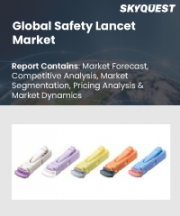
|
시장보고서
상품코드
1833577
버튼 작동식 안전 란셋 시장 예측(-2032년) : 게이지 사이즈, 침투 깊이, 유통 경로, 용도, 최종 사용자, 지역별 분석Button-activated Safety Lancet Market Forecasts to 2032 - Global Analysis By Gauge Size (18G-21G (High Flow), 22G-25G (Moderate Flow), and 26G-30G (Low Flow)), Penetration Depth, Distribution Channel, Application, End User and By Geography |
||||||
Stratistics MRC에 따르면 세계의 버튼 작동식 안전 란셋 시장은 2025년 7억 7,338만 달러를 차지하고, 2032년에는 19억 2,335만 달러에 이를 것으로 예측되며, 예측 기간 동안 13.9%의 연평균 복합 성장률(CAGR)을 나타낼 전망입니다.
버튼 작동식 안전 란셋은 포도당 모니터링 및 진단 검사에 자주 사용되는 모세 혈관 채혈을 위한 무균 기구입니다. 케이싱 내에 고정된 숨겨진 바늘이 내장되어 있어 버튼을 누르는 것만으로 방출됩니다. 이 디자인은 우발적인 바늘의 노출을 방지하면서 최소한의 불쾌감으로 제어되는 신속한 채혈을 가능하게 합니다. 사용 후에는 바늘이 자동으로 수납되므로, 채혈 처치 중의 의료 스탭과 환자 모두에게, 안전성, 감염 관리, 일회용의 신뢰성이 확보됩니다.
국제 당뇨병 연합이 발표한 데이터에 따르면 2050년까지 아프리카의 당뇨병 유병자 수는 6,000만 명에 달할 것으로 추정되고 있습니다. 이 증가는 2024년 같은 지역에서 당뇨병 유병률에 비해 약 142%입니다.
만성 질환 증가
당뇨병, 심혈관 질환, 신장 장애 등의 만성 질환의 부담이 증가하고 있기 때문에 버튼 작동식 안전 란셋과 같은 신뢰할 수 있는 채혈기구에 대한 수요가 높아지고 있습니다. 이러한 기구는 특히 장기 질환 모니터링에 있어서 모세 혈관 채혈의 보다 안전하고 효율적인 방법을 제공합니다. 건강 관리 시스템이 예방 의료 및 조기 진단으로 이동함에 따라, 란셋은 일상적인 검사 프로토콜에 필수적이 되고 있습니다. 바늘의 디자인과 통증을 줄이는 메커니즘의 기술 발전은 환자의 컴플라이언스를 향상시키고 있습니다. 인구의 고령화와 신흥국의 진단 의식 증가는 사용자 기반을 더욱 확대하고 있습니다. 또, 맞춤형 의료나 POC(Point of Care) 진단의 대두도 시장의 추풍이 되고 있습니다.
대체 비침습적 검사 기술의 상승
웨어러블 바이오센서 및 광학 포도당 모니터와 같은 비침습적 진단 도구의 출현은 전통적인 란셋을 이용한 검사의 성장에 어려움을 겪고 있습니다. 이러한 대체 기술은 통증이 없는 모니터링과 지속적인 데이터 추적을 제공하며 기술에 익숙하고 주사 바늘을 싫어하는 환자에게 호소합니다. 경피 및 타액 기반 검사의 기술 혁신은 특히 재택 관리 및 소아과 환경에서 지지를 받고 있습니다. 디지털 건강 플랫폼이 이러한 기술을 통합함에 따라 특정 부문에서는 란셋에 대한 의존도가 떨어질 수 있습니다. 비침습적 장비에 대한 규제 지원은 시장 진입과 채용을 가속화하고 있습니다. 이 시프트는 첨단 건강 관리 생태계에서 버튼 작동식 안전 란셋의 확장을 제한할 수 있습니다.
디지털 건강 및 원격 의료와의 통합
원격 의료 및 원격 환자 모니터링의 보급은 버튼 작동식 안전 란셋에 새로운 기회를 제공합니다. 이러한 장치는 종종 분산형 케어를 지원하기 위해 가정용 진단 키트 및 연결 건강 플랫폼과 번들로 제공됩니다. 모바일 앱 및 클라우드 기반 데이터 시스템과의 통합으로 검사 결과와 환자의 어드히어런스를 완벽하게 추적할 수 있습니다. 새로운 동향으로는 블루투스 연결의 스마트 랜셋과 만성 질환 관리를 위한 자동 기록 기능 등이 있습니다. 의료 서비스 제공업체는 이러한 도구를 활용하여 가상 진찰을 강화하고 병원 진찰을 줄이기 위해 노력하고 있습니다. 디지털 에코시스템이 진화함에 따라 안전 란셋은 원격 진단 워크플로우에 필수적인 요소가 되고 있습니다.
위조품과 비표준 품질
열악한 제품은 적절한 멸균이 없으며 국제 안전 기준을 충족하지 못하는 경우가 많으며 감염 위험이 증가하고 부정확한 결과를 초래합니다. 온라인 마켓플레이스와 단편화된 유통 채널은 악성 장비의 확산을 조장합니다. 규제기관은 이 문제를 억제하기 위해 감시와 단속을 강화하고 있지만 신흥 시장에서는 여전히 격차가 남아 있습니다. 제조업체 각 회사는 제품의 무결성을 보호하기 위해 사기 방지 포장 및 추적성 기술에 투자하고 있습니다. 엄격한 품질 관리가 이루어지지 않으면 소비자 신뢰와 임상 신뢰성이 손상될 위험이 있습니다.
COVID-19의 영향:
COVID-19의 대유행은 특히 재택치료 및 검역 환경에서 안전하고 사용하기 쉬운 채혈 도구에 대한 수요를 가속화했습니다. 버튼 작동식 안전 란셋은 집단 검사 및 격리 중 만성 질환의 모니터링에 중요한 역할을 수행했습니다. 처음에는 공급망의 혼란이 생산을 방해했지만 제조업체는 자동화 및 지역 조달 전략에 따라 적응했습니다. 규제 당국은 가정용 기기의 승인을 신속하게 진행하여 시장 접근을 확대했습니다. 유행성 후, 감염 대책과 분산형 케어가 중시되게 되어, 헬스케어 현장에서의 란셋의 보급이 계속되고 있습니다.
예측 기간 동안 소매 약국 부문이 최대가 될 전망
소매 약국 부문은 접근하기 쉽고 소비자 다리가 많기 때문에 예측 기간 동안 최대 시장 점유율을 차지할 것으로 예측됩니다. 약국은 자체 검사 키트 및 만성 질환 모니터링 도구의 주요 유통 기지 역할을 합니다. 란셋 제조업체와 약국 체인과의 전략적 제휴로 제품의 인지도와 입수성이 높아지고 있습니다. 디지털 재고 및 전자 처방 시스템 등 약국 업무의 기술적 업그레이드가 란셋 판매를 간소화하고 있습니다. 시판되는 진단 및 웰니스 프로그램의 상승은 수요를 더욱 밀어 올리고 있습니다. 소비자의 건강 의식이 높아지는 가운데 소매 약국은 란셋의 유통과 교육의 중심이되고 있습니다.
예측 기간 동안 CAGR이 가장 높을 것으로 예상되는 것은 가정 의료 분야입니다.
예측 기간 동안, 환자 중심의 케어로의 전환으로 견인되어, 재택 케어 세팅 분야가 가장 높은 성장률을 나타낼 것으로 예측됩니다. 원격 모니터링과 자기 검사 증가로 가정에서 만성 질환을 관리하는 개인의 힘이 증가하고 있습니다. 사용하기 쉽고 통증을 최소화하도록 설계된 란셋은 노인과 소아 환자 사이에서 인기를 끌고 있습니다. 원격 의료 플랫폼 및 모바일 건강 앱과의 통합은 가정용 란셋의 유용성을 향상시킵니다. 제조업체 각 회사는 인체 공학을 기반으로 한 디자인 및 번들 키트에 주력하여이 부문을 지원합니다. 건강 관리가 분산됨에 따라 홈 케어는 안전 란셋의 중요한 성장 프론티어로 부상하고 있습니다.
최대 점유율을 차지하는 지역
예측 기간 동안 아시아태평양은 최대 시장 점유율을 차지할 것으로 예상되며, 이는 건강 관리 인프라의 확대와 진단 수요 증가에 의해 지원됩니다. 중국, 인도, 일본과 같은 국가들은 공중 보건 프로그램과 만성 질환 스크리닝 이니셔티브에 투자하고 있습니다. 현지 생산과 유리한 정부 정책은 란셋 생산과 저렴한 가격을 뒷받침하고 있습니다. 이 지역에서는 디지털 건강 도구와 모바일 진단의 급속한 보급이 보이고 란셋의 보급이 진행되고 있습니다. 세계 기업과 지역 판매자와의 전략적 제휴가 시장 진입을 가속화하고 있습니다. 당뇨병 인구가 많고 인지도가 높아지고 있는 아시아태평양은 여전히 시장량의 주요 촉진요인입니다.
CAGR이 가장 높은 지역:
예측 기간 동안 북미가 가장 높은 CAGR을 나타낼 것으로 예측되며, 이는 혁신과 견조한 건강 관리 지출에 기여하고 있습니다. 미국과 캐나다는 스마트 란셋과 통합 진단 플랫폼 개발에 주력하고 있습니다. 규제 당국은 가정용 장비와 연결 장치의 승인 경로를 간소화하여 신속한 상업화를 촉진하고 있습니다. 원격 의료와 원격 모니터링의 높은 보급률이 사용하기 쉬운 란셋 수요를 밀어 올리고 있습니다. 이 지역은 또한 강력한 상환의 틀과 소비자 계몽 캠페인으로부터 혜택을 받고 있습니다. 정밀진단이 진화하는 가운데, 북미는 란셋의 혁신과 성장의 벤치마크를 계속 설정하고 있습니다.
무료 주문을 받아서 만드는 서비스:
이 보고서를 구독하는 고객은 다음 무료 맞춤설정 옵션 중 하나를 사용할 수 있습니다.
- 기업 프로파일
- 추가 시장 기업의 종합적 프로파일링(3개사까지)
- 주요 기업의 SWOT 분석(3개사까지)
- 지역 세분화
- 고객의 관심에 응한 주요국 시장 추계, 예측 및 CAGR(주 : 타당성 확인에 따름)
- 경쟁 벤치마킹
- 제품 포트폴리오, 지리적 존재, 전략적 제휴에 기반한 주요 기업 벤치마킹
목차
제1장 주요 요약
제2장 서문
- 개요
- 이해관계자
- 조사 범위
- 조사 방법
- 데이터 마이닝
- 데이터 분석
- 데이터 검증
- 조사 접근
- 조사 자료
- 1차 조사 자료
- 2차 조사 정보원
- 전제조건
제3장 시장 동향 분석
- 성장 촉진요인
- 억제요인
- 기회
- 위협
- 용도 분석
- 최종 사용자 분석
- 신흥 시장
- COVID-19의 영향
제4장 Porter's Five Forces 분석
- 공급기업의 협상력
- 구매자의 협상력
- 대체품의 위협
- 신규 참가업체의 위협
- 경쟁 기업간 경쟁 관계
제5장 세계의 버튼 작동식 안전 란셋 시장 : 게이지 사이즈별
- 18G-21G(고유량)
- 22G-25G(중유량)
- 26G-30G(저유량)
제6장 세계의 버튼 작동식 안전 란셋 시장 : 침투 심도별
- 1.0mm 미만
- 1.0-2.0mm
제7장 세계의 버튼 작동식 안전 란셋 시장 : 유통 경로별
- 직접 판매
- 소매 약국
- 의료용품 판매업자
- 온라인 플랫폼
제8장 세계의 버튼 작동식 안전 란셋 시장 : 용도별
- 혈당 검사
- 신생아 발뒤꿈치 천자
- 헤모글로빈 검사
- 콜레스테롤 검사
- 응고 검사
- 기타 용도
제9장 세계의 버튼 작동식 안전 란셋 시장 : 최종 사용자별
- 병원
- 혈액은행
- 진단실험실
- 재택 케어 설정
- 기타 최종 사용자
제10장 세계의 버튼 작동식 안전 란셋 시장 : 지역별
- 북미
- 미국
- 캐나다
- 멕시코
- 유럽
- 독일
- 영국
- 이탈리아
- 프랑스
- 스페인
- 기타 유럽
- 아시아태평양
- 일본
- 중국
- 인도
- 호주
- 뉴질랜드
- 한국
- 기타 아시아태평양
- 남미
- 아르헨티나
- 브라질
- 칠레
- 기타 남미
- 중동 및 아프리카
- 사우디아라비아
- 아랍에미리트(UAE)
- 카타르
- 남아프리카
- 기타 중동 및 아프리카
제11장 주요 발전
- 계약, 파트너십, 협업, 합작투자
- 인수와 합병
- 신제품 발매
- 사업 확대
- 기타 주요 전략
제12장 기업 프로파일링
- Cardinal Health
- Improve Medical
- HTL-STREFA
- Arkray Inc.
- SARSTEDT AG & Co. KG
- Lifescan Inc.
- Terumo Corporation
- Smiths Medical
- Greiner Bio-One
- Nipro Corporation
- Medline Industries
- Roche Diagnostics
- Owen Mumford
- Abbott Laboratories
- Braun Melsungen AG
According to Stratistics MRC, the Global Button-activated Safety Lancet Market is accounted for $773.38 million in 2025 and is expected to reach $1923.35 million by 2032 growing at a CAGR of 13.9% during the forecast period. A button-activated safety lancet is a sterile device used for obtaining capillary blood, often in glucose monitoring and diagnostic tests. It incorporates a hidden needle secured inside a casing, released by a simple button press. This design provides controlled, rapid puncturing with minimal discomfort while preventing accidental needle exposure. The needle retracts automatically after use, ensuring safety, infection control, and single-use reliability for both medical staff and patients during blood sampling procedures.
According to data published by the International Diabetes Federation, the prevalence of diabetes is estimated to reach 60 million in Africa by 2050. This increase is around 142% as compared to the diabetes prevalence in the region in 2024.
Market Dynamics:
Driver:
Rising prevalence of chronic diseases
The growing burden of chronic illnesses such as diabetes, cardiovascular conditions, and renal disorders is fueling demand for reliable blood sampling tools like button-activated safety lancets. These devices offer a safer and more efficient method for capillary blood collection, especially in long-term disease monitoring. As healthcare systems shift toward preventive care and early diagnosis, lancets are becoming integral to routine testing protocols. Technological advancements in needle design and pain-reduction mechanisms are improving patient compliance. Aging populations and increasing diagnostic awareness in emerging economies are further expanding the user base. The market is also benefiting from the rise of personalized medicine and point-of-care diagnostics.
Restraint:
Rise of alternative non-invasive testing technologies
The emergence of non-invasive diagnostic tools such as wearable biosensors and optical glucose monitors is challenging the growth of traditional lancet-based testing. These alternatives offer pain-free monitoring and continuous data tracking, appealing to tech-savvy and needle-averse patients. Innovations in transdermal and saliva-based testing are gaining traction, especially in homecare and pediatric settings. As digital health platforms integrate these technologies, the reliance on lancets may decline in certain segments. Regulatory support for non-invasive devices is accelerating their market entry and adoption. This shift could limit the expansion of button-activated safety lancets in advanced healthcare ecosystems.
Opportunity:
Integration with digital health and telemedicine
The growing adoption of telehealth and remote patient monitoring is creating new opportunities for button-activated safety lancets. These devices are increasingly bundled with home diagnostic kits and connected health platforms to support decentralized care. Integration with mobile apps and cloud-based data systems enables seamless tracking of test results and patient adherence. Emerging trends include smart lancets with Bluetooth connectivity and auto-logging features for chronic disease management. Healthcare providers are leveraging these tools to enhance virtual consultations and reduce hospital visits. As digital ecosystems evolve, safety lancets are becoming essential components of remote diagnostic workflows.
Threat:
Counterfeit products and substandard quality
Substandard products often lack proper sterilization and fail to meet international safety standards, leading to increased risk of infection and inaccurate results. Online marketplaces and fragmented distribution channels are contributing to the spread of unauthorized devices. Regulatory bodies are ramping up surveillance and enforcement to curb this issue, but gaps remain in emerging markets. Manufacturers are investing in tamper-proof packaging and traceability technologies to protect product integrity. Without stringent quality control, the market risks erosion of consumer trust and clinical reliability.
Covid-19 Impact:
The COVID-19 pandemic accelerated the demand for safe and easy-to-use blood sampling tools, especially in homecare and quarantine settings. Button-activated safety lancets played a crucial role in mass testing and monitoring of chronic conditions during lockdowns. Supply chain disruptions initially hampered production, but manufacturers adapted through automation and regional sourcing strategies. Regulatory agencies fast-tracked approvals for home-use devices, expanding market access. Post-pandemic, the emphasis on infection control and decentralized care continues to drive lancet adoption across healthcare settings.
The retail pharmacies segment is expected to be the largest during the forecast period
The retail pharmacies segment is expected to account for the largest market share during the forecast period, due to its accessibility and high consumer footfall. Pharmacies serve as key distribution points for self-testing kits and chronic disease monitoring tools. Strategic collaborations between lancet manufacturers and pharmacy chains are enhancing product visibility and availability. Technological upgrades in pharmacy operations, including digital inventory and e-prescription systems, are streamlining lancet sales. The rise of over-the-counter diagnostics and wellness programs is further boosting demand. As consumer health awareness grows, retail pharmacies remain central to lancet distribution and education.
The homecare settings segment is expected to have the highest CAGR during the forecast period
Over the forecast period, the homecare settings segment is predicted to witness the highest growth rate, driven by the shift toward patient-centric care. The rise of remote monitoring and self-testing is empowering individuals to manage chronic conditions from home. Lancets designed for ease of use and minimal pain are gaining popularity among elderly and pediatric users. Integration with telemedicine platforms and mobile health apps is enhancing the utility of home-use lancets. Manufacturers are focusing on ergonomic designs and bundled kits to cater to this segment. As healthcare decentralizes, homecare emerges as a vital growth frontier for safety lancets.
Region with largest share:
During the forecast period, the Asia Pacificregion is expected to hold the largest market share, supported by expanding healthcare infrastructure and rising diagnostic demand. Countries like China, India, and Japan are investing in public health programs and chronic disease screening initiatives. Local manufacturing and favorable government policies are boosting lancet production and affordability. The region is witnessing rapid adoption of digital health tools and mobile diagnostics, enhancing lancet penetration. Strategic alliances between global players and regional distributors are accelerating market access. With a large diabetic population and growing awareness, Asia Pacific remains a key driver of market volume.
Region with highest CAGR:
Over the forecast period, the North America region is anticipated to exhibit the highest CAGR, fuelled by technological innovation and robust healthcare spending. The U.S. and Canada are leading in the development of smart lancets and integrated diagnostic platforms. Regulatory agencies are streamlining approval pathways for home-use and connected devices, encouraging rapid commercialization. High adoption of telehealth and remote monitoring is boosting demand for user-friendly lancets. The region also benefits from strong reimbursement frameworks and consumer awareness campaigns. As precision diagnostics evolve, North America continues to set the benchmark for lancet innovation and growth.
Key players in the market
Some of the key players in Button-activated Safety Lancet Market include Cardinal Health, Improve Medical, HTL-STREFA, Arkray Inc., SARSTEDT AG & Co. KG, Lifescan Inc., Terumo Corporation, Smiths Medical, Greiner Bio-One, Nipro Corporation, Medline Industries, Roche Diagnostics, Owen Mumford, Abbott Laboratories, and Braun Melsungen AG.
Key Developments:
In July2025, Cardinal Health announced the expansion of Equity Rx, to help meet the needs of people across Ohio and beyond who cannot afford their prescription medications. Launched as a pilot in Ohio in 2023, Equity Rx was created through a partnership of the Cardinal Health Foundation, the Charitable Healthcare Network (CHN) and St. Vincent de Paul Charitable Pharmacy in Cincinnati, Ohio.
In September2021, LifeScanand Welldoc, a digital health leader revolutionizing chronic care, announced a strategic partnership to incorporate Welldoc's chronic condition platform, supporting hypertension, heart failure, diabetes, pre-diabetes and behavioral health, into the new OneTouch(R) Solutions portal, designed to offer a choice of support, guidance and digital tools to help people not just manage diabetes but thrive.
Gauge Sizes Covered:
- 18G-21G (High Flow)
- 22G-25G (Moderate Flow)
- 26G-30G (Low Flow)
Penetration Depths Covered:
- <1.0 mm
- 1.0-2.0 mm
Distribution Channels Covered:
- Direct Sales
- Retail Pharmacies
- Medical Supply Distributors
- Online Platforms
Applications Covered:
- Blood Glucose Testing
- Neonatal Heel Stick
- Hemoglobin Testing
- Cholesterol Testing
- Coagulation Testing
- Other Applications
End Users Covered:
- Hospitals
- Blood Banks
- Diagnostic Laboratories
- Homecare Settings
- Other End Users
Regions Covered:
- North America
- US
- Canada
- Mexico
- Europe
- Germany
- UK
- Italy
- France
- Spain
- Rest of Europe
- Asia Pacific
- Japan
- China
- India
- Australia
- New Zealand
- South Korea
- Rest of Asia Pacific
- South America
- Argentina
- Brazil
- Chile
- Rest of South America
- Middle East & Africa
- Saudi Arabia
- UAE
- Qatar
- South Africa
- Rest of Middle East & Africa
What our report offers:
- Market share assessments for the regional and country-level segments
- Strategic recommendations for the new entrants
- Covers Market data for the years 2024, 2025, 2026, 2028, and 2032
- Market Trends (Drivers, Constraints, Opportunities, Threats, Challenges, Investment Opportunities, and recommendations)
- Strategic recommendations in key business segments based on the market estimations
- Competitive landscaping mapping the key common trends
- Company profiling with detailed strategies, financials, and recent developments
- Supply chain trends mapping the latest technological advancements
Free Customization Offerings:
All the customers of this report will be entitled to receive one of the following free customization options:
- Company Profiling
- Comprehensive profiling of additional market players (up to 3)
- SWOT Analysis of key players (up to 3)
- Regional Segmentation
- Market estimations, Forecasts and CAGR of any prominent country as per the client's interest (Note: Depends on feasibility check)
- Competitive Benchmarking
- Benchmarking of key players based on product portfolio, geographical presence, and strategic alliances
Table of Contents
1 Executive Summary
2 Preface
- 2.1 Abstract
- 2.2 Stake Holders
- 2.3 Research Scope
- 2.4 Research Methodology
- 2.4.1 Data Mining
- 2.4.2 Data Analysis
- 2.4.3 Data Validation
- 2.4.4 Research Approach
- 2.5 Research Sources
- 2.5.1 Primary Research Sources
- 2.5.2 Secondary Research Sources
- 2.5.3 Assumptions
3 Market Trend Analysis
- 3.1 Introduction
- 3.2 Drivers
- 3.3 Restraints
- 3.4 Opportunities
- 3.5 Threats
- 3.6 Application Analysis
- 3.7 End User Analysis
- 3.8 Emerging Markets
- 3.9 Impact of Covid-19
4 Porters Five Force Analysis
- 4.1 Bargaining power of suppliers
- 4.2 Bargaining power of buyers
- 4.3 Threat of substitutes
- 4.4 Threat of new entrants
- 4.5 Competitive rivalry
5 Global Button-activated Safety Lancet Market, By Gauge Size
- 5.1 Introduction
- 5.2 18G-21G (High Flow)
- 5.3 22G-25G (Moderate Flow)
- 5.4 26G-30G (Low Flow)
6 Global Button-activated Safety Lancet Market, By Penetration Depth
- 6.1 Introduction
- 6.2 <1.0 mm
- 6.3 1.0-2.0 mm
7 Global Button-activated Safety Lancet Market, By Distribution Channel
- 7.1 Introduction
- 7.2 Direct Sales
- 7.3 Retail Pharmacies
- 7.4 Medical Supply Distributors
- 7.5 Online Platforms
8 Global Button-activated Safety Lancet Market, By Application
- 8.1 Introduction
- 8.2 Blood Glucose Testing
- 8.3 Neonatal Heel Stick
- 8.4 Hemoglobin Testing
- 8.5 Cholesterol Testing
- 8.6 Coagulation Testing
- 8.7 Other Applications
9 Global Button-activated Safety Lancet Market, By End User
- 9.1 Introduction
- 9.2 Hospitals
- 9.3 Blood Banks
- 9.4 Diagnostic Laboratories
- 9.5 Homecare Settings
- 9.6 Other End Users
10 Global Button-activated Safety Lancet Market, By Geography
- 10.1 Introduction
- 10.2 North America
- 10.2.1 US
- 10.2.2 Canada
- 10.2.3 Mexico
- 10.3 Europe
- 10.3.1 Germany
- 10.3.2 UK
- 10.3.3 Italy
- 10.3.4 France
- 10.3.5 Spain
- 10.3.6 Rest of Europe
- 10.4 Asia Pacific
- 10.4.1 Japan
- 10.4.2 China
- 10.4.3 India
- 10.4.4 Australia
- 10.4.5 New Zealand
- 10.4.6 South Korea
- 10.4.7 Rest of Asia Pacific
- 10.5 South America
- 10.5.1 Argentina
- 10.5.2 Brazil
- 10.5.3 Chile
- 10.5.4 Rest of South America
- 10.6 Middle East & Africa
- 10.6.1 Saudi Arabia
- 10.6.2 UAE
- 10.6.3 Qatar
- 10.6.4 South Africa
- 10.6.5 Rest of Middle East & Africa
11 Key Developments
- 11.1 Agreements, Partnerships, Collaborations and Joint Ventures
- 11.2 Acquisitions & Mergers
- 11.3 New Product Launch
- 11.4 Expansions
- 11.5 Other Key Strategies
12 Company Profiling
- 12.1 Cardinal Health
- 12.2 Improve Medical
- 12.3 HTL-STREFA
- 12.4 Arkray Inc.
- 12.5 SARSTEDT AG & Co. KG
- 12.6 Lifescan Inc.
- 12.7 Terumo Corporation
- 12.8 Smiths Medical
- 12.9 Greiner Bio-One
- 12.10 Nipro Corporation
- 12.11 Medline Industries
- 12.12 Roche Diagnostics
- 12.13 Owen Mumford
- 12.14 Abbott Laboratories
- 12.15 Braun Melsungen AG



















